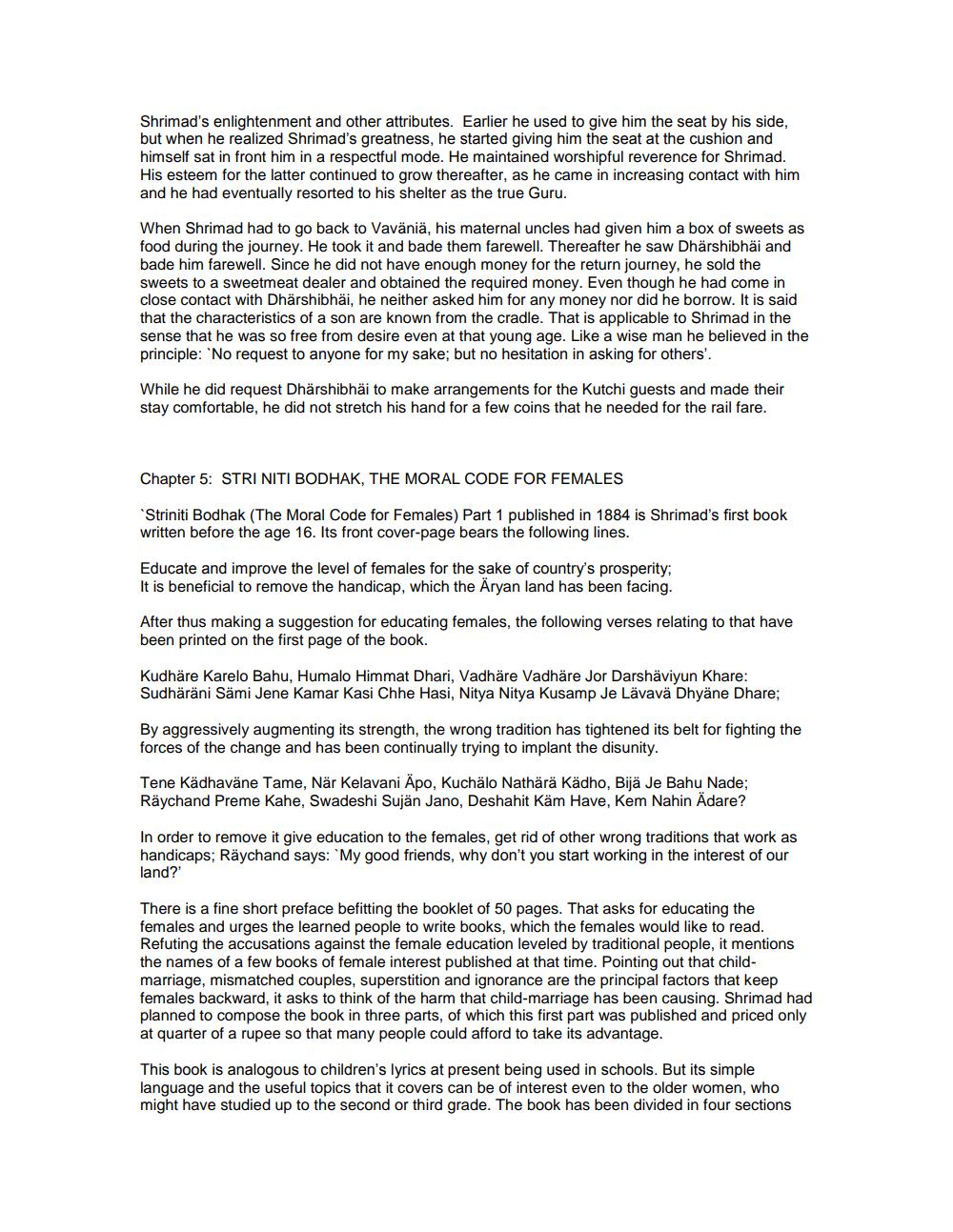________________
Shrimad's enlightenment and other attributes. Earlier he used to give him the seat by his side, but when he realized Shrimad's greatness, he started giving him the seat at the cushion and himself sat in front him in a respectful mode. He maintained worshipful reverence for Shrimad His esteem for the latter continued to grow thereafter, as he came in increasing contact with him and he had eventually resorted to his shelter as the true Guru.
When Shrimad had to go back to Vaväniä, his maternal uncles had given him a box of sweets as food during the journey. He took it and bade them farewell. Thereafter he saw Dhärshibhai and bade him farewell. Since he did not have enough money for the return journey, he sold the sweets to a sweetmeat dealer and obtained the required money. Even though he had come in close contact with Dhärshibhäi, he neither asked him for any money nor did he borrow. It is said that the characteristics of a son are known from the cradle. That is applicable to Shrimad in the sense that he was so free from desire even at that young age. Like a wise man he believed in the principle: 'No request to anyone for my sake; but no hesitation in asking for others'.
While he did request Dhärshibhäi to make arrangements for the Kutchi guests and made their stay comfortable, he did not stretch his hand for a few coins that he needed for the rail fare.
Chapter 5: STRI NITI BODHAK, THE MORAL CODE FOR FEMALES
Striniti Bodhak (The Moral Code for Females) Part 1 published in 1884 is Shrimad's first book written before the age 16. Its front cover-page bears the following lines.
Educate and improve the level of females for the sake of country's prosperity; It is beneficial to remove the handicap, which the Aryan land has been facing.
After thus making a suggestion for educating females, the following verses relating to that have been printed on the first page of the book.
Kudhäre Karelo Bahu, Humalo Himmat Dhari, Vadhäre Vadhäre Jor Darshäviyun Khare: Sudhäräni Sami Jene Kamar Kasi Chhe Hasi, Nitya Nitya Kusamp Je Lävavä Dhyäne Dhare;
By aggressively augmenting its strength, the wrong tradition has tightened its belt for fighting the forces of the change and has been continually trying to implant the disunity.
Tene Kädhavane Tame, När Kelavani Apo, Kuchalo Nathärä Kädho, Bijä Je Bahu Nade; Räychand Preme Kahe, Swadeshi Sujan Jano, Deshahit Käm Have, Kem Nahin Adare?
In order to remove it give education to the females, get rid of other wrong traditions that work as handicaps; Räychand says: My good friends, why don't you start working in the interest of our land?
There is a fine short preface befitting the booklet of 50 pages. That asks for educating the females and urges the learned people to write books, which the females would like to read. Refuting the accusations against the female education leveled by traditional people, it mentions the names of a few books of female interest published at that time. Pointing out that childmarriage, mismatched couples, superstition and ignorance are the principal factors that keep females backward, it asks to think of the harm that child-marriage has been causing. Shrimad had planned to compose the book in three parts, of which this first part was published and priced only at quarter of a rupee so that many people could afford to take its advantage.
This book is analogous to children's lyrics at present being used in schools. But its simple language and the useful topics that it covers can be of interest even to the older women, who might have studied up to the second or third grade. The book has been divided in four sections




